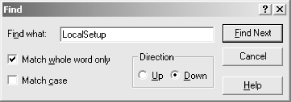5.5 Searching for Keys
RegEdt32 's
search capability is much less capable than RegEdit
's, but it's better than nothing. Where
RegEdit can search key names, value names, and
value contents, RegEdt32 can search only key
names. This is still useful, however, since most of the available
documentation covering Registry keys gives you the key names even
when value names and contents aren't specified.
When you search the Registry with RegEdt32, the
search starts at whatever key you currently have selected and
proceeds until one of two things happens: a match is found, or the
search hits the end of the Registry. In the former case,
RegEdt32 highlights the matching key. In the
latter, it displays a dialog telling you that no more instances of
the search string can be found.
You get to RegEdt32's Find dialog with
the View Find Key menu command. The dialog itself is
shown in Figure 5.4. It looks, and works, very much
like the Find dialogs of other applications you've probably
used before, such as Notepad and Wordpad. Here's what its
controls do: Find Key menu command. The dialog itself is
shown in Figure 5.4. It looks, and works, very much
like the Find dialogs of other applications you've probably
used before, such as Notepad and Wordpad. Here's what its
controls do:
You specify the key name you want to find by typing all or part of it
into the "Find what" field. You may also use the standard
Windows keyboard shortcuts to cut, copy, or paste Clipboard text into
this field. The "Match whole word only" and "Match case"
checkboxes control how RegEdt32 compares the
search string you type against the Registry data. By default, both
these checkboxes are off. The Up and Down radio buttons control the direction in which
RegEdt32 searches: Up searches from the selected
key to the root key of the active window, while Down searches from
the selected key to the last subkey of the last key of the active
root.

Each time RegEdt32 finds a match, it highlights
the matching key in the tree pane of the active root key window. You
can then use the Find Next button to search for the next instance, or
the Cancel button to stop looking.
 |
If you want to find keys and values with maximum flexibility, the
excellent Registry Search & Replace utility is probably what
you're looking for. It's an easy-to-use, flexible tool
for searching the Registry. You can get it at
http://www.iserv.net/~sjhswdev/REGSRCH.HTM.
|
|
|
